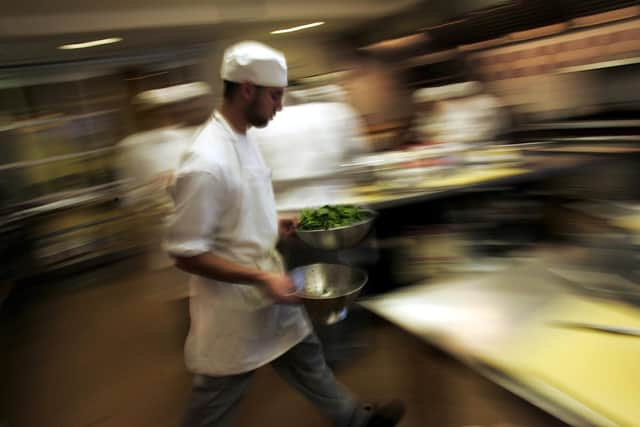Phantom restaurants need honesty to get through crisis - Martyn McLaughlin
On the face of it, it seemed as good a guarantee as any of an excellent meal. The tasting menu promised an explosion of flavours and locally sourced produce - a rack of lamb, served with red cabbage, sultanas, and parsley potatoes? Don’t mind if I do.
Our appetites were further whetted by the restaurant’s website, which boasted multiple AA rosettes - a sure sign of its culinary prowess. Even a cursory search of Google threw up multiple gushing reviews, no doubt testament to the fact that the restaurant is run by an award-winning chef.
Advertisement
Hide AdAdvertisement
Hide AdOr at least, it used to be. Unbeknownst to us, the place had changed hands in the midst of the pandemic, during which time experienced staff had drifted away to find other work. When it eventually reopened, all that really remained was the name and, of course, the reputation.
As we soon discovered, that hard-won standing was now in jeopardy. Despite having a booking for 8pm, we arrived to find the restaurant closed, with its tables set for breakfast the next morning. After being offered an unset table in an annex next to the staff break room, we politely asked for a table in the restaurant itself, and a half hour after arriving, we were finally seated.
There was a distinct Fawlty Towers feel to the place - as the only diners present, we were told we had free reign to choose the music via an Alexa speaker - but we looked forward to the food. Sadly, the first course - scallops - proved so bad as to be completely inedible, a fact our waiter seemed aware of beforehand. “Too chewy?” he asked before we said a thing. Well, I was going to comment on the sour, fishy smell, but now that you mention it.
Things did not improve much from then on, and we decided to cut short the experience after just two courses. The restaurant, seemingly oblivious to the poor fare and even worse service on offer, tried to charge us for the full meal, which left a taste in the mouth comparable to the scallops. It is fair to say that I have left bigger tips.


As we drove home, we joked and compared the whole experience to something that belonged in the dark days of 1980s customer service. But the humour gave way to a conversation I suspect many people will be having at the moment. Given the devastation caused by the pandemic and the aftershocks of Brexit, how do you deal with the problem of phantom restaurants promising an experience they cannot possibly hope to deliver?
The bolthole we chose was not unique in the challenges it faced. Up and down the country, there is a chronic lack of skilled staff in the wider tourism industry. The figures are in flux, but the most recent shortfall was put at around 45,000.
Many restaurants have closed for good. Among those businesses which managed to fend off the headwinds, cash reserves have been eaten up, and the labour force crisis is hampering their efforts to get back up to speed ahead of the peak summer months.
Some hotels and restaurants have been trying to recruit chefs from as far afield as India and South Africa, but it is just not enough to address the exodus of workers who have left in the aftermath of Brexit, let alone the wider problems such as ongoing supply chain disruption and escalating running costs.
Advertisement
Hide AdAdvertisement
Hide AdAll of which raises two questions, the first being for customers: do you stand by the industry at a time of upheaval and continue to support restaurants with your custom? Even with the cost of living crisis biting, I would like to think most people will. Like many households, our disposable income has been culled over the past year, but we still try to eat out as often as possible.
The second question, aimed at restaurateurs, is perhaps more contentious: is it fair to trade on past glories when you know the food and service you are offering isn’t up to scratch?
Some places are being upfront about the challenges they face, and the knock on effects they are having on their businesses. Many restaurants and cafes are still operating on reduced hours, with their menu options significantly pared back.
One restaurant I visit regularly in the south side of Glasgow usually has a staff pool of around 40 people. Last week, its general manager told me that number now stood at 15. “We’re having to refuse bookings because we know we can’t deliver,” he told me. Is it ideal? Of course not, but it at least ensures those people able to secure tables will have as good an experience as possible.
The flipside to this, of course, is the eatery we visited, and others like it. They may be trying to struggle through the crisis, but their approach strikes me as unfair on customers, as well as exhausted staff. I have nothing but admiration for those in the industry who are trying to make a go of things at a time of major economic upheaval, but a little honesty goes a long way.
Times are tough, and the likelihood is, things are going to get worse before they get better. But be upfront about the problems you are facing, and ask yourself which is more important in the long run - your revenues, or your reputation. And if the scallops smell fishy, don’t let them leave the kitchen.
Comments
Want to join the conversation? Please or to comment on this article.